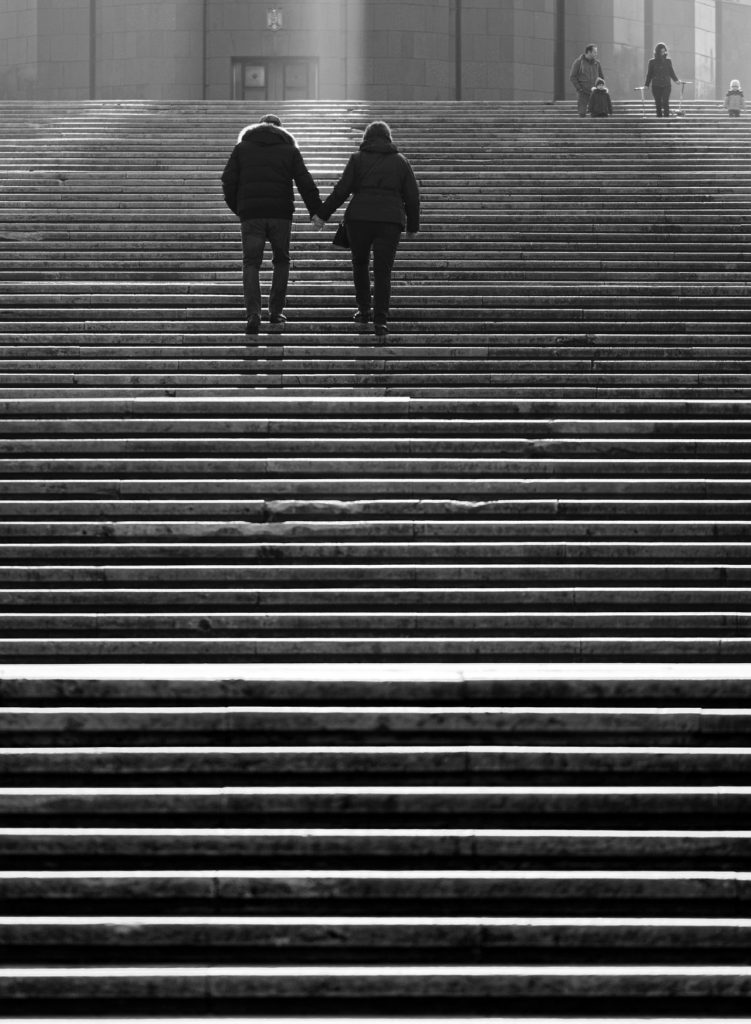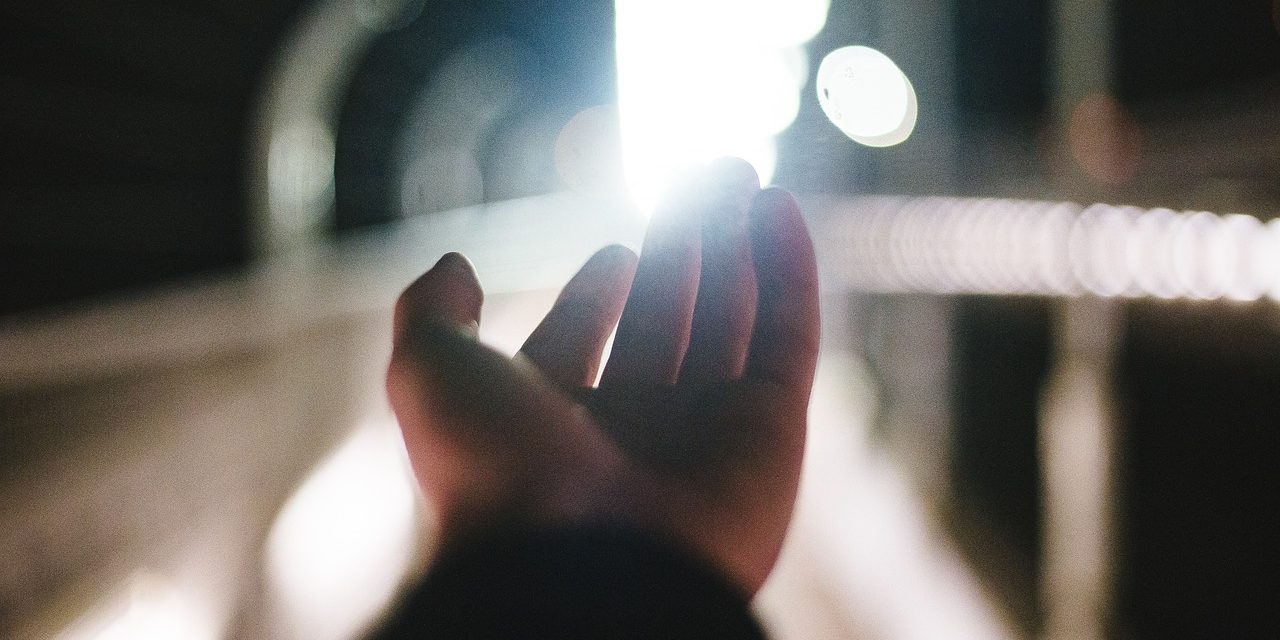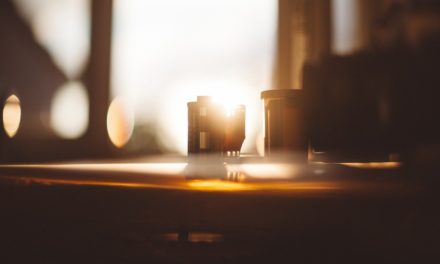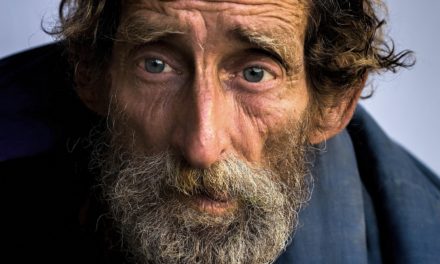I am climbing the stairwell at St. Thomas Hospital, Akron Ohio, up to the eighth floor, top of the building on the top of North Hill. With no electro-mechanical device attached to me, I have only my own senses to monitor my self-administered stress test. Reaching the top, I descend and repeat.
Outside, in the cold breeze, statues of Mary, Joseph, and Jesus, face north, alone save each other, unwatched in the cold wind. Behind them is our car in a nearly empty parking deck. In front of them, across the circle drive to the front entrance, is Dr. Bob’s Way (actually Olive Street), in honor of the historic connection between St. Thomas Hospital and Alcoholics Anonymous. Newspaper says the hospital may close in two years, but for now, an Akron medical corporation still runs the place, and the eighth floor is quite busy with patients recovering from surgery. As I climb and climb, I think of my mother giving birth to me in this old building. Nine of her ten children were born here, back when it was still a Catholic hospital. Back when we lived in a Catholic world, a parallel culture, with our own schools, newspapers, hospitals, and cemeteries. Born at St. Thomas and buried at Holy Cross.
From your room on the 8th Floor, the southwest corner of the building, if you could get out of the bed that clutches you and peek behind those heavy curtains, you could look across Elizabeth Park Valley to West Hill, and the stone tower of old St. Vincent Church where I was baptized, where all ten of us were baptized. When I was a terrible two, and restless in church, swooning from the old lady smells of lilac and stale tobacco, I slipped and split my lip on the next pew. Dad took me, wailing, out into the vestibule, to the left of the tower as you look from your window, where doors lead to the walkway between the church and the rectory. He put me over his shoulder and patted my back as I looked at the little fountain where my sister Anne had been recently baptized, where we all were baptized, with a little sprinkle of holy water and a dab of holy oil. If I had that oil here now, I would rub it down your stitches.
It is easy to remember my own infant baptism because I watched Anne, Joe, Helen, Margaret, and Tom get baptized there. In a big family, you remember each other’s experiences as your own, adopting shared triumphs and humiliations in a sort of collective memory. And so, I now remember my baptism, with Aunt Betty and Uncle Kevin as my godparents, another uncle, John the priest, and my brother and sisters, watching and squirming, wondering when it would all be over. What a strange scene for me to witness now in this echoing stairwell, a scene where the principle parties are dead, except for me and my older siblings. My parents, now dead. The godparents, even younger, but also dead. The priest dead, this hospital, almost dead, and yet there stands the church, still baptizing 66 years later.
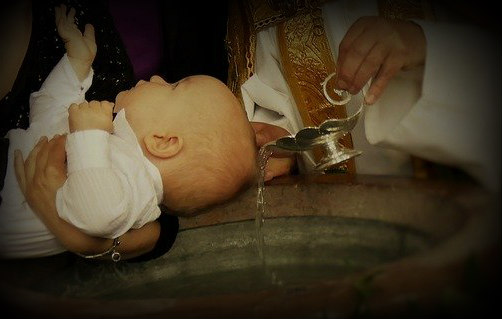
I know what you are thinking. Why is he off climbing stairs? Why is he watching his own baptism when I am the one just back from the other dimension, or wherever people go during five hours of general anesthesia? It is a fair question, and one for which I will seek an answer as my mind wanders and my feet keep counting flights of stairs. I can’t climb much longer, so be patient with me.
My mother was not baptized at St Vincent, but she did, as a girl, look across from her home here on North Hill, with dreams of going over the valley to St. Vincent High School. She had her life planned out. She would save every dime for tuition and walk across the Main St. Viaduct each day to get to school. It was the 1920’s and Akron was booming. The Viaduct was a new and magical path for a little North Akron Catholic girl. But the Great Depression ended the dream. Little cracks formed, and the Viaduct began to crumble, raining chunks of concrete into Elizabeth Park Valley. My grandparents lost the brick house up by St. Martha’s, and moved into a little pre-Civil War farmhouse in Tallmadge, with six children and no potable water. Oh, how they missed the bright lights of Akron! Oddly enough, the same Great Depression that blew my mother’s family out of North Akron, blew my father’s family all the way from Pittsburgh PA to West Hill, up there, just beyond St. Vincent Church. It sort-of blew your family around too, didn’t it? All those wayward winds, blowing people in and out of cities like Akron and Cleveland. We humans aren’t so different from dandelions, the way we blossom bright yellow, turn white, and catch the wind to wind up who knows where, like the winds that blew us both to Kent Ohio, around the time the 1960’s died, the winds that left us baffled and married, and unsure what to make of each other. Our 8th story view makes it all seem so harmless and fated, so very important and equally unimportant.
As I climb the stairs at St. Thomas Hospital, two flights per story, I come to a sign over a glass door covering a large plumbing fixture. The sign says, STANDPIPE FOR FIRE DEPARTMENT USE ONLY. Then, another locked door with a window into a whole world of large black pipe twisting this way and that, carrying who knows what to who knows where, and I think of my father during my early childhood, when he worked all sorts of pipes going this way and that. If we look out your eighth-floor window there is a building missing between us and St. Vincent’s, the old Beech Street Steam Plant, with its black smokestacks and mountainous coal pile, the place that heated downtown Akron via steam pipes under the streets, twisting this way and that, up into the old buildings that stand no more, and some that still do. My father worked at that plant and all over downtown, or really, all under downtown, in the tunnels where the plumbers and steamfitters go, Akron underground, pipes beneath the city and smoke above, twisting and billowing this way and that, from that mysterious brick building which stands no more, down by the canal that made the city, the canal dug by the Irishmen who stayed on to build St. Vincent’s.
This hospital is named for Thomas the Apostle, famous for doubting the risen Lord. You, who are much more a scholar of such things than I, say “Doubting Thomas” got a bad rap. You have read his gospel and considered his journey East. I always kind of liked him for questioning that ghostly figure, that post-crucifixion Jesus, but, as a child, I was a bit squeamish when he asked to put his fingers in the wounds and then believed. We call him a doubter, but we also name hospitals after him. Could his touch have been healing for Jesus, even as feeling those wounds of crucifixion healed Thomas of his doubts? I am squeamish about your wounds too, my darling, even though I do not doubt it is you, back from anesthesia, groggy and ghostly though you may be. You will need my healing touch, and I will need to really feel you, but am I up to the job?
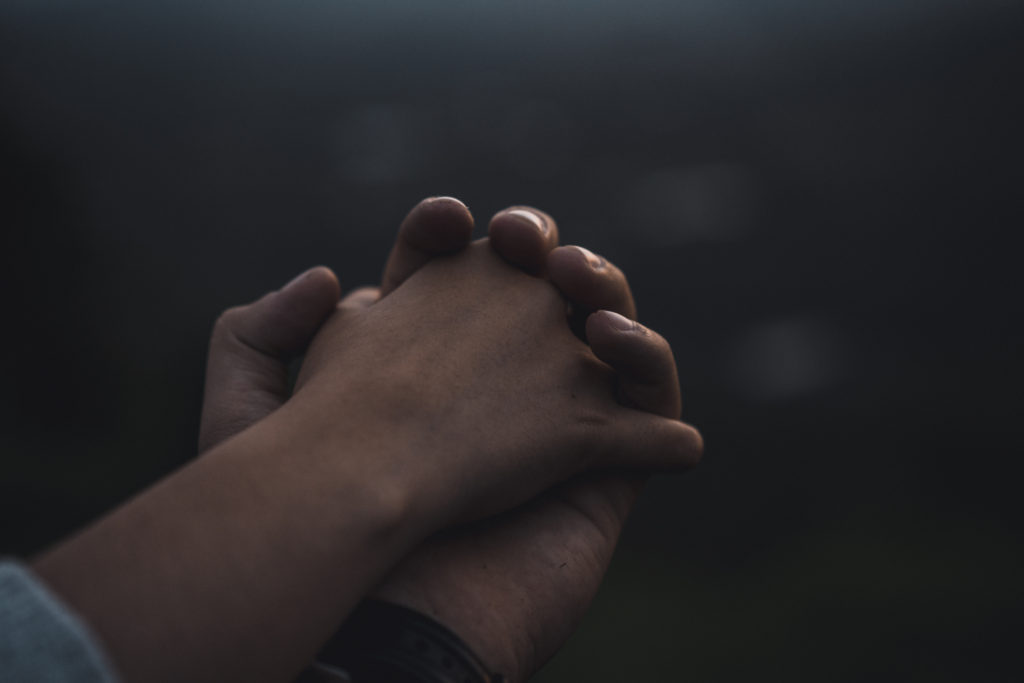
My father always had a feel for metal, how not to strip the threads or round over the head of the bolt. I can hear him when I pick up a pipe wrench, “wrenches come in pairs, one for turning and the other for backing up in the opposite direction. You don’t want to over-twist those old pipes.” It’s like he knew I was a born over-twister, but his hands, at once powerful and gentle when working metal, could be just as gentle when soothing us. My mother had a light touch on the piano keys. She was one of those musical children in this industrial town, like little Pat Pace, the accordion prodigy. The winds blew him from accordion to piano, from North Hill to West Hill, from Buchtel High to Julliard, from Julliard to jazz and his struggles with heroin. Did he come back here to St. Thomas addiction ward in the end, before his funeral, over the valley at St. Sebastian’s?
How weird this must sound to non-Catholic ears. We used to be called idolaters, what with all the statues, all the patron saints and courtly angels, but could it really hurt to say a prayer to Sister Ignatia and Dr Bob? To ask for a little help in this addiction crisis, with the child prodigies of post-industrial Akron slipping away, one overdose at a time?
My mother was no Pat Pace, but I loved the way she touched those white and black keys, and the way that touched my heart. My grandmother played the organ, and mom, the piano, and I play neither. My great-grandfather was a blacksmith and my father a mechanic and a pipefitter, and I do none of that. Each parent had a light touch in such different ways, and yet somehow felt each other. I have always been a bit deficient in this area. Maybe it is why I do it with words, striving to phrase with just the right torque, with a light feeling, or at least a light touch.
But now you will need me to be more hands on. You will need me to really feel, or at least to learn to touch. I must be your pupil as you teach my fingers to play, as you admonish me not to over-twist. Got to man up, get in touch with myself and you through me, to find that healing rhythm. I feel it in this flow of words, this flow of feet upon the stairs. I know you need more than these words.
When this season of healing is over, when you forgive me my awkwardness, I will bring you back here. Maybe this place will be as empty as a zombie mall, but we will climb these stairs and find a window and we will show each other all the places that are and were and aren’t anymore. We will trace our sacred journeys on the dirty windowpanes. And I will learn to trace your scars, to find their exquisite beauty, to touch and feel, to believe and heal.
Let this be my promise.
